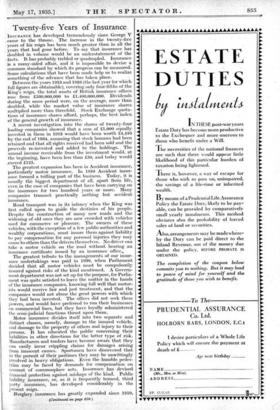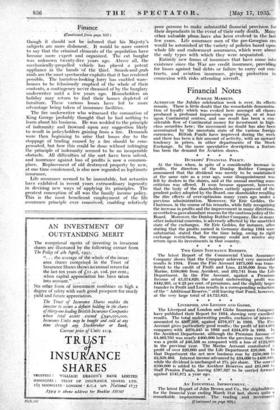Twenty-five Years of Insurance _
INSURANCE has developed tremendously since George V . came to the throne. The increase in the twenty-five years of his reign has been much greater than in all the years that had gone before. To say that insurance has doubled in volume would be an understatement of the facts. It has probably trebled or quadrupled. Insurance is a many-sided affair, and it is impossible to devise a . common standard by which its progress can be measured. Some calculations that have been made help us to realize something of the advance that has taken place.
Between the years 1913 and 1933 (the last year for which full figures are obtainable), covering only four-fifths of the King's reign, the total assets of British insurance offices rose from £530,000,000 to £1,400,000,000. Dividends during the same period were, on the average, more than doubled, while the market value of ' insurance shares multiplied more than threefold. Stock Exchange quota- tions of insurance shares afford, perhaps, the best index of the general growth of insurance. A recent investigation into the shares of twenty-four leading companies showed that a sum of £1,000 equally invested in them in 1913 would have been worth £4,416 by the end of 1934, assuming that stock bonuses had been retained and that all rights received had been sold and the proceeds re-invested and added to the holdings. The annual income receivable from the investment would, at the beginning, have been less than £50, and today would .exceed £125.
The greatest expansion has been in Accident insurance, particularly motor insurance. In 1910 Accident insur- ance formed a trifling part of the business. Today, it is usually the biggest department of all, apart from life, even in the case of companies that have been carrying on fire insurance for two hundred years or more. Many companies transact practically nothing but accident insurance.
Road transport was in its infancy when the King was first called upon to guide the destinies of his people. Despite the construction of many new roads and the widening of old ones they are now crowded with vehicles used for commerce or pleasure. The owners of these vehicles, with the exception of a few public authorities and wealthy corporations, must insure them against liability to pay compensation for any personal injuries they may cause to others than the drivers themselves. No driver can take a motor vehicle on the road without bearing an insurance certificate issued by an insurance office..
The greatest tribute to the managements of our insur- ance undertakings was paid in 1930, when Parliament decided that all motor vehicles must be compulsorily insured against risks of the kind mentioned. A Govern- ment department was not set up for the purpose, for Parlia- ment was quite satisfied to leave the matter in the hands of the insurance companies, knowing full well that motor- ists, would receive fair and just treatment, and that the companies would not abuse the great -powers with which they had been invested. The offices did not seek these powers, and would have preferred to run their businesses on commercial lines, but they have loyally administered the semi-judicial functions thrust upon them. Motor insurance divides itself into two separate and distinct classes, namely, damage to the insured vehicle, and damage to the property of others and injury to their persons. It has educated the public concerning their liabilities in, other directions for the latter type of risk. Manufacturers and traders have become aware that they can easily incur crippling claims for damages arising from innocent causes. Sportsmen have discovered that in the pursuit of their pastimes they may be unwittingly involved in heavy obligations. Even the humble pedes- trian may be faced by demands for compensation on account of commonplace acts. Insurance has devised, financial protection against mishaps of the kind. Public liability insurance, or, as it is frequently termed, third party insurance, has developed considerably in the present reign. Burglary insurance has greatly expanded since 1910, (Continued on page 856 )
Finance
(Continued from page 855.) though it should -not be inferred that his Majesty's subjects are more dishonest. It would be more "correct to say that the. criminal elements of the population have become more expert and organized. The cat burglar was unknown. twenty-five' years ago. Above all, the mechanically-propelled vehicle has placed a potent appliance in the hands—of the thief. Smash-and-grab raids are the most spectacular exploits that it has rendered possible. The harmless-looking lorry has enabled ware- houses to be feloniously emptied of the whole of their contents, a contingency nev=er drearifed of by the burglary underwriter until a few years ago. Householders on holiday may return to find . their homes depleted of furniture. These various losses have led to more advantage being taken of insurance facilities.
The fire underwriter who witnessed the coronation of . King George Probably thought that he had nothing to learn about his business. He was wedded to the principle of indemnity and froivnca --Upon any. suggestion likely to result in policyholders gaining from a fire. Demands were then.. beginning to arise that losses due to the stoppage of trading caused.,by a fire should . be com- pensated, but how this could be done without infringing the principle of indemnity seemed to be an insuperable . obstacle. All difficulties of the sort have: been solved, and insurance against loth of profits is now a common- place. Replacement of old destroyed property by new, at one time condemned, is also now regarded as legitimate insurance.
Life assurance seemed to be .immutable,, but actuaries have exhibited in 'recent years extraordinary ingenuity in devising new ways Of -applying its principles. The greatest conception of all was the family income policy. This is the most beneficent employment of the life assurance principle ever conceived, enabling relatively poor persons to make substantial financial provision for their dependants in the event Of their early death. Many other valuable plans , have also been evolved in the last few years. Life assurance men of the pre-Georgian era • would be astonished at the Variety of policies based upon whole life and endowment assurances, which were about the only types with which they were acquainted. Entirely new forms of insurance that - have come into existence since . the War are credit insurance, providing for losses against bad debts or failure to carry out con- tracts, and aviation -insurance, giving protection in connexion with risks attending aircraft. "











































 Previous page
Previous page